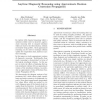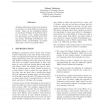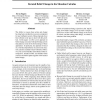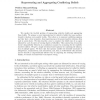130
click to vote
KR
2000
Springer
15 years 5 months ago
2000
Springer
In contrast with classical reasoning, where a solution is either correct or incorrect, approximate reasoning tries to compute solutions which are close to the ideal solution, with...
108
click to vote
KR
2000
Springer
15 years 5 months ago
2000
Springer
Acquiring information about its environment by sensing is a crucial ability of autonomous robots. Based on the established solution to the Frame Problem of the Fluent Calculus, we...
111
click to vote
KR
2000
Springer
15 years 5 months ago
2000
Springer
The ability to reason about action and change has long been considered a necessary component for any intelligent system. Many proposals have been offered in the past to deal with ...
115
click to vote
KR
2000
Springer
15 years 5 months ago
2000
Springer
We address the experiences of the DARPA High Performance Knowledge Bases (HPKB) (Cohen et al., 1998) project in practical knowledge representation. The purpose of the HPKB project...
KR
2000
Springer
15 years 5 months ago
2000
Springer
100
click to vote
KR
2000
Springer
15 years 5 months ago
2000
Springer
Large-scale ontologies are becoming an essential component of many applications including standard search (such as Yahoo and Lycos), ecommerce (such as Amazon and eBay), configura...
100
click to vote
KR
2000
Springer
15 years 5 months ago
2000
Springer
We propose to extend the ontology of logical AI to include approximate objects, approximate predicates and approximate theories. Besides the ontology we treat the relations among ...
KR
2000
Springer
15 years 5 months ago
2000
Springer
We consider the two-fold problem of representing collective beliefs and aggregating these beliefs. We propose a novel representation for collective beliefs that uses modular, tran...
116
click to vote
KR
2000
Springer
15 years 5 months ago
2000
Springer
Recent experimental results have shown that the strength of resolution, the propositional DPLL procedure, the KSAT procedure for description logics, or related tableau-like implem...
KR
2000
Springer
15 years 5 months ago
2000
Springer
Though overriding as a single and default mode of inheritance is adequate for most knowledge bases, a large class of applications naturally requires several inheritance modes and ...




